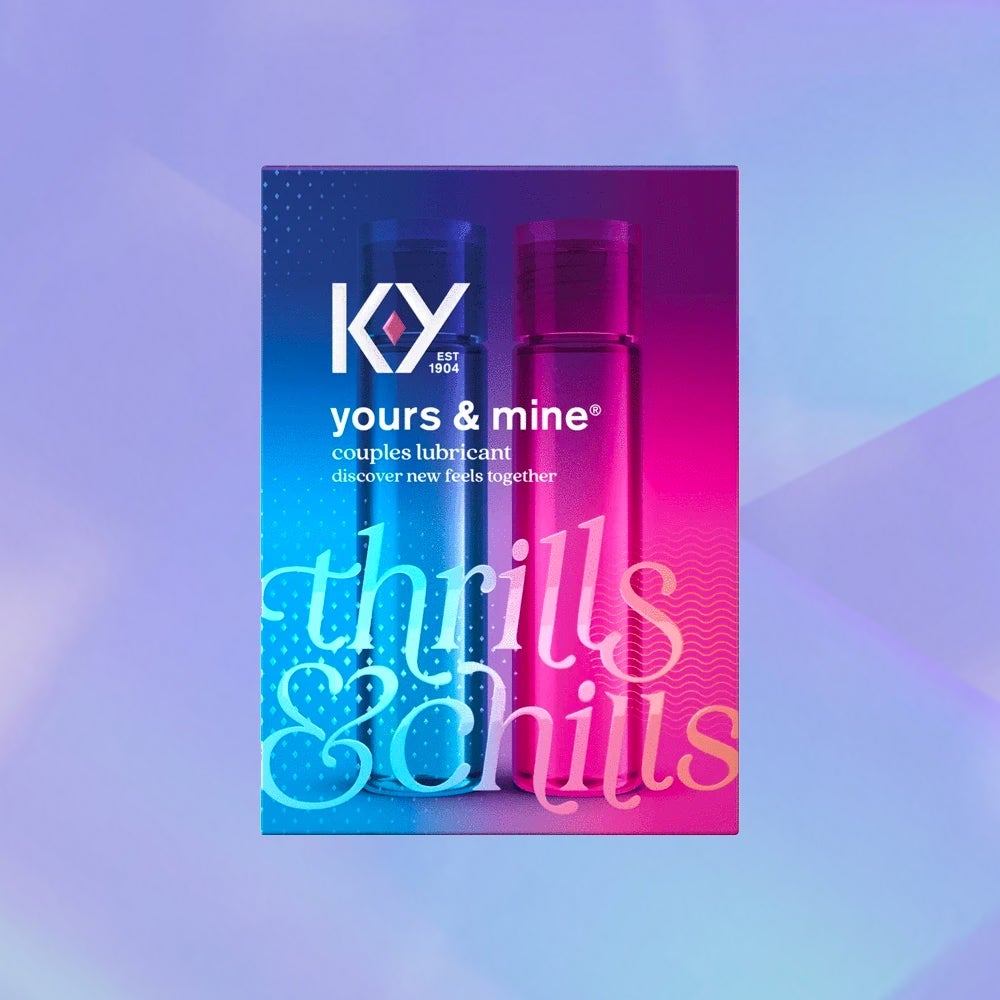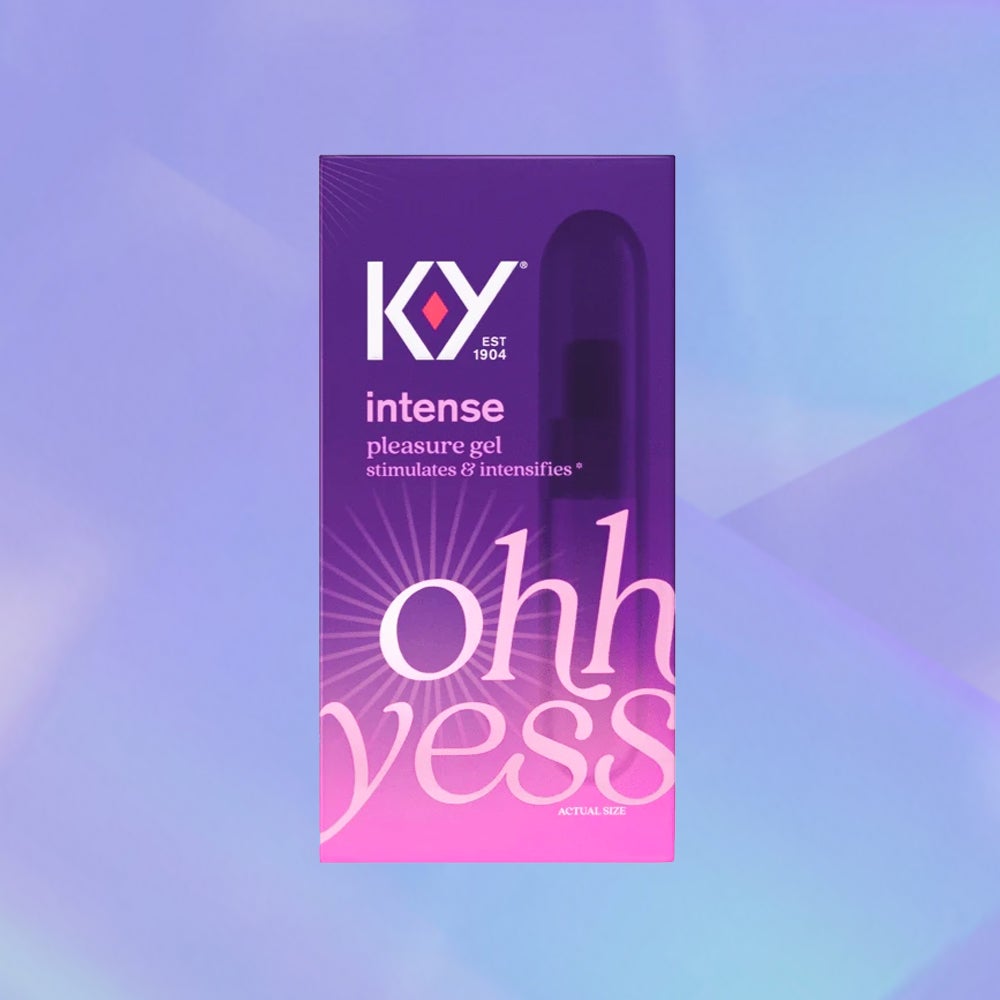Lube Could Be Your Key To Better Orgasms — Here’s What You Need To Know
Of all the nightstand accoutrements you might keep on hand for intimate moments, lube is often the most misunderstood. Condoms, toys, and the like serve their various, stimulative purposes, but lube occupies a strange grey area: We tend to see it as a solution to a problem.
Rather than advertised as a means of heightening pleasure, it’s a product that often comes recommended as a compensation for vaginal dryness — usually targeted at menopausal women. We’re told that it works as a band-aid for subpar sex –– a stigma that can preclude us from employing lube to enjoy even better sex.
AdvertisementADVERTISEMENT
“The reality is that lube can be amazing for everyone,” says Vanessa Marin, liscensed psychotherapist and founder of Vanessa Marin Sex Therapy. Almost anyone’s sex life will benefit from using it.” And in the midst of a particularly tough year, as we face the prospect of a long, dark winter (in which we’ll all likely be relegated indoors), we all deserve the opportunity to lean into pleasure.
So, for the sake of, well, climax, we teamed up with KY to put together a top-line guide to all things lube. From use-cases and product details to partner play techniques and overall benefits, here’s everything you need to know to introduce lubricant into the bedroom.
Why use lube?
Lube is exactly what it sounds like: A gel-like substance that creates lubrication to decrease friction, whether it’s used during penetrative sex, a hand job, oral sex, or with a toy. Anyone can use lube — but that said, during solo play or intercourse, some people may find more of a need for it than others.
Vaginal dryness, while more likely to occur during and after menopause, affects the vagina at all ages. In fact, 13-31% of women experience some form of routine dryness, according to 2018 data from medical journal Integrative Medicine. Naturally, there are a number of factors that might lead to dryness: Dr. Karen Duncan, OBGYN and assistant professor at NYU Langone Health says that hormonal contraceptives, certain medications, and the act of breastfeeding can all contribute to the sensation. But dryness can still occur sans outside factors — and contrary to popular belief, it doesn’t necessarily have anything to do with how turned on a person might be. “There’s this misconception that if you have enough foreplay, then you shouldn’t need lube,” she says. “But that’s not the case either.”
AdvertisementADVERTISEMENT
Simply put, vaginal dryness can also be entirely random — it’s not always dependent on your arousal or some pre-existing condition. “There's this term called non-concordance, which basically means that our bodies can respond in an opposing way to our brains,” says Marin. “You can be really, really turned on but completely dry. Or you could be very wet, and not at all in the mood. The same thing happens with people with penises — you can get an erection at the worst possible moment.”
Dryness can also be the result of your emotional state and what you’re imbibing — so it might not be you, it could just be...2020. In the same way alcohol can contribute to erectile dysfunction, it can also contribute to vaginal dryness: Since alcohol is dehydrating, it can make it harder for your body to naturally lubricate. The same holds true for smoking both cigarettes and marijuana. And — shocking to few among us — stress can play a similar role, increasing the likelihood that you’ll have a hard time producing enough lubrication naturally. So, whether you’ve been anxiety-cleaning and watching the news all day, or tossing back martinis, lube might be the thing that makes sure you can still access the pleasure you deserve.
Of course, lube isn’t just used to alleviate vaginal dryness. It’s also generally cited as a must-have for anal sex. Since the anus doesn’t naturally produce lubrication, lube should always used during anal sex, says board-certified sexologist, Dr. Megan Stubbs. As she explains it, it will help prevent rips or tears in the skin, bleeding, and rectal pain. And for this reason, it’s also a good idea for any kind of anal play, like fingering and rimming — think of it as a necessary add-on for the sake of everyone’s enjoyment.
AdvertisementADVERTISEMENT
And moreover, if you’re engaging in any kind of sexual play for a particularly long time, it’s also a good idea to reapply lube whenever you start to feel a little more friction. How frequently you need to reapply will depend on the individual, but as Stubbs notes, “your body is only going to produce so much lubrication naturally.” Whether or not you’ve got plenty of natural lubrication to start, when you’re playing the long game, you may need to supplement to keep energy high.
What are the different kinds of lube?
If you know you have sensitive skin, Dr. Duncan recommends looking for a lube with fewer ingredients (so it’s less likely to have additives, glycerin, or parabens that might cause an unwanted reaction). Whenever you buy a new lube, always do a patch test on your arm before applying it to your genitals — especially if you’re using a lube with a warm or tingling sensation — to make sure that you like the way it feels and that it doesn’t cause an unwanted reaction like itching, swelling, or redness.
If you’re using lube while trying to get pregnant, there are options specifically formulated for fertility. “It’s not that the lubricant is meant to deliberately harm sperm, but there can be some ingredients that have this effect,” Dr. Duncan says. If this is a concern, she recommends talking to your doctor to get their stamp of approval on the best kind of lubrication for you.
Most are water-, silicone-, or oil-based — the choice between the three comes down to personal preference and what kind of play you’re engaging in — so there’s something for everyone. “If you try one and don’t like it, try another one,” says Dr. Duncan.
AdvertisementADVERTISEMENT
Water-based
If you’ve never used lube before, a water-based lube like KY’s is a great place to start — it washes off easier than silicone- or oil-based lubes, doesn’t stain, and can be safely used with any kind of sex toy. “[Water-based lubes] are an easy intro,” Dr. Duncan says. That said, they do wear off faster than other types of lube, so don’t be shy when it comes to reapplying, especially if you’re going for longevity play.
Silicone-based
Compared to water-based lubes, silicone-based options have a more slippery feel — which some might consider to be more “luxurious” of a sensation. They also tend to feel thicker, and last longer without requiring reapplication, making them a great option for sexual activities like anal play, when the body isn’t producing any natural lubrication. However, if you’re using toys, this may not be the best option for you. “Over time, a silicone-based lubricant will degrade silicone toys,” says certified sex therapist and licensed marriage and family therapist Dr. Lexx Brown-James. “Especially if it’s a favorite, you don’t want to cause it any harm.”
Oil-based
If you’re looking for a lube that works well for external play — like a genital massage or oral sex — oil-based lubes are a great, long-lasting option. They can be used during penetrative sex, but do so with caution: They can break down latex, making protective barriers like condoms and dental dams more likely to break. “So if there’s a possibility you might have to stop in the middle of sex and say, ‘Wait a minute, is this a latex condom?’ you shouldn’t use an oil-based lubricant,” says Dr. Duncan.
AdvertisementADVERTISEMENT
How much lube should you use?
For the most part, this is a matter of personal preference. But know that there is, in fact, such a thing as too much lube: You don’t necessarily want to slip and slide during sex. Stubbs recommends starting out with a small amount: A single pump or a dime-sized dollop. See how it reacts with your body, and if you need more, add a little more. It may also be necessary to reapply the longer you’re active, especially if you’re using a water-based lube.
How should you incorporate lube into your sex life?
If you’ve never used lube before, you might feel some intimidation or even embarrassment about introducing it to the bedroom — but for the sake of everyone’s pleasure, it may be a thoroughly worthwhile conversation to have with your partner. “Rather than building it up into this big conversation, keep it light and straightforward,” says Marin. “Say something like, ‘We’ve never played with lube before, and I think it would be fun to try. What do you think?’”
When it comes to introducing lube to a more casual or short-term partner, she recommends using it on them first, to simply help them get acclimated with the sensation. Stubbs echoes this statement: “You can say, ‘Hey, I like using this while doing this activity. Do you want me to put it on?’” For the sake of convenience — and to squelch any embarrassment surrounding stigma — Marin also recommends decanting your favorite lube into a simple pump bottle you can keep on your nightstand, so whether you’re with a long-term or more casual partner, you can simply reach over and get a quick pump of lube when you need it in the moment.
AdvertisementADVERTISEMENT
Lube might be most often used for penetrative sex, but that’s not all it can improve. Stubbs recommends flavored lubricants for external play, and Marin is a big proponent of using lubrication during handjobs, massage, and solo- or partnered- masturbation. For those with vaginas, she notes that lube can increase sensitivity around the vulva, making both toys or your hands glide easier for a more dramatic sensation (and an easier, or just all-around-better orgasm). Simply put, lube can heighten your pleasure during any kind of simulative play.
Plus, even if you have no trouble producing natural lubrication, “sometimes, there’s no time for foreplay,” says Dr. Duncan. If you only have time for a quickie, lube is an essential.
What are the benefits of using lube?
Because lube reduces friction, it also reduces the chance that barrier methods like condoms and dental dams will tear, and it makes them more comfortable. Plus, it can prevent injury. “If you’re a person who feels a burning sensation when peeing after sex, oftentimes that means you have microtears on the inside of your labia caused by chafing,” explains Brown-James. “They’re uncomfortable, and can also increase your chance of getting an infection.” A complete lack of lubrication — or not quite enough — can also cause perineal tears (scratches on the skin between the genitals and the anus, most commonly associated with childbirth) and, in the case of anal sex, anal fissures (tears that occur at the opening of the anus, and can result in pain and bleeding). If minor, both perineal tears and anal fissures can heal on their own, but they may require medical attention.
AdvertisementADVERTISEMENT
Above all, lubricants aren’t just made to decrease pain — they’re meant to make sex more fun and pleasant for everyone involved. “And that’s a very, very positive and important benefit,” says Dr. Duncan.
AdvertisementADVERTISEMENT









